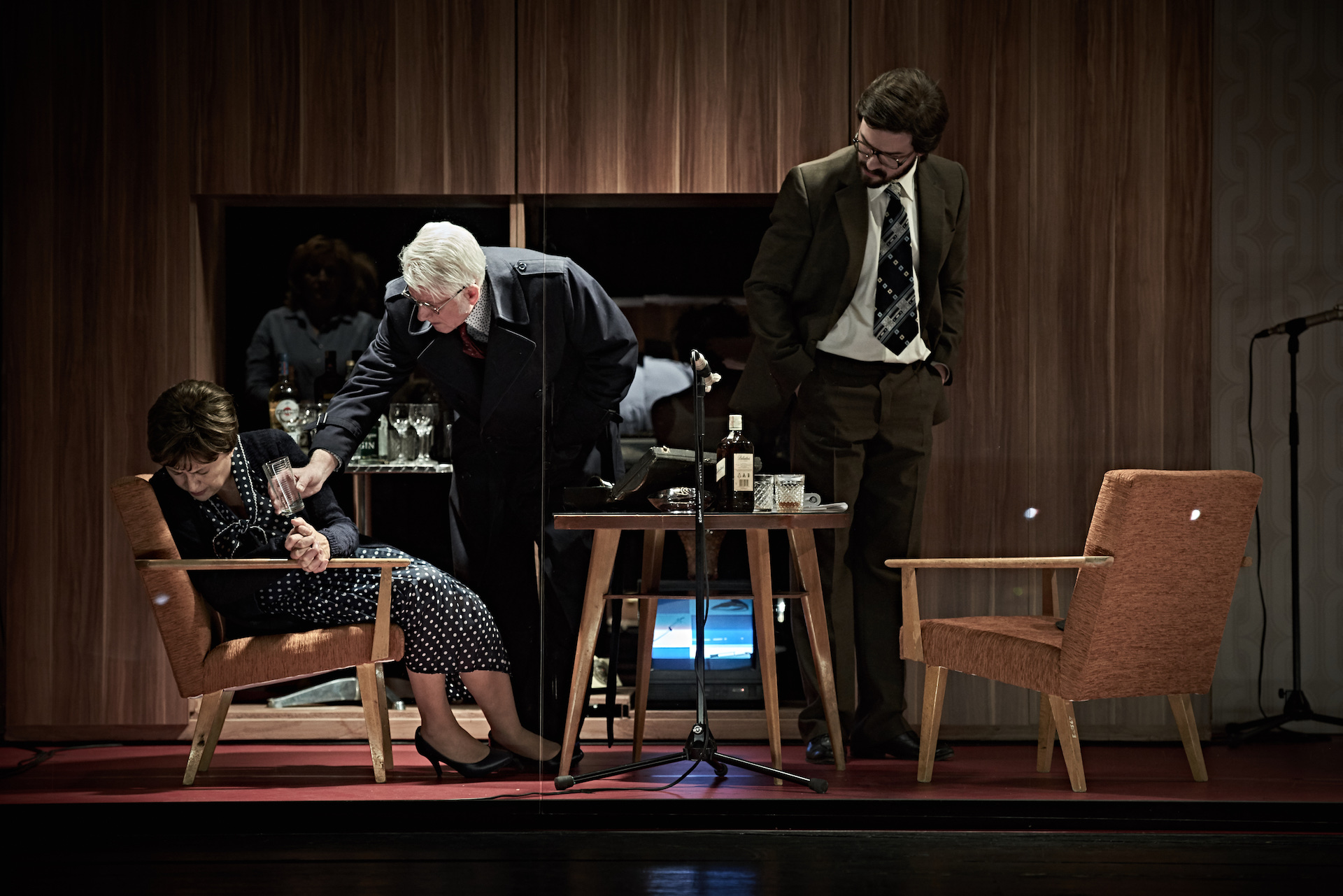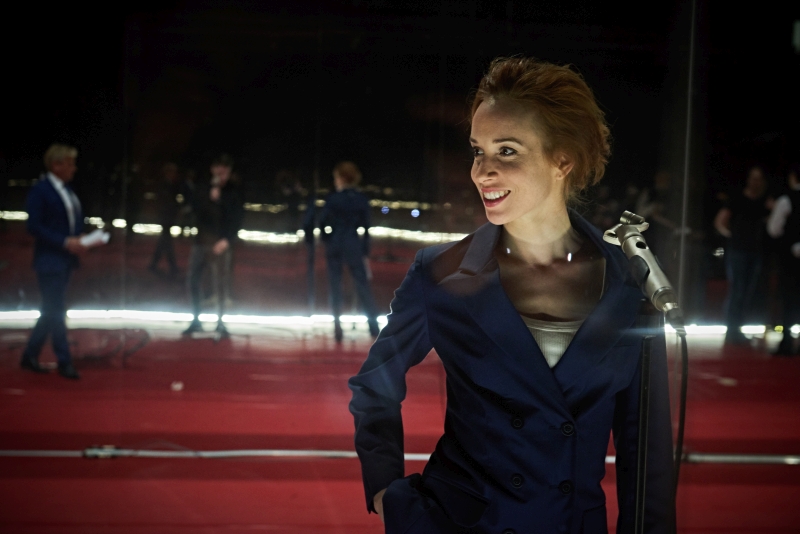SUCH NORMAL INFORMERS
ELITES BY JIŘÍ HAVELKA
„It should move you. Not passively, one should not get the feeling that the people we are watching are bad, which is often the case with the artistic interpretation of social phenomena. We should rather do a cleansing in our own ranks. It is easy to say that the elite are dead, that they do not exist anymore, but we are all responsible for our own selves. That is the major change brought by 1989.” (from the program notes of the production of Elites)
Jiří Havelka the author of this statement, and the director of the production called Elites in the Slovak National Theatre, would be pleased: I am his ideal spectator. On my way from this performance, which is about the mechanisms of the communist secret police in former Czechoslovakia, and long after it, I kept thinking about myself. Brought up in a perfectly normalized family environment, I entered my teens in the late seventies thinking that the world I was living in was all right. What saved me from being part of the criminal framework of an enslaved society? Partly maybe my individual character (no desire to make a big career) and the great luck of meeting the right people when my character was being formed. Looking at those times from a distance – can I feel like the innocent victim of an amoral regime and judge others? Hardly! But on the other hand – does that mean that I should forbid myself assuming a critical attitude towards the past? Should I live feeling like an accomplice and leave others to be enraged, the younger people, who did not experience normalization and so could not be corrupted by it?
Havelka’s production does not explicitly pose questions like this; these dilemmas arise from what the director shows, what he has the actors perform. “Performing” is perhaps the most accurate word here – nothing much is dramatically acted out, nothing is deeply pondered, nothing is analysed at length. The creators do not even try to enhance the “urgency” of the topic with some ingenious stage metaphors.
The production consists mainly of a series of short scenes; they come at a fast pace, no rest, no mercy. When writing the script, Jiří Havelka and the rest of the team used concrete stories from the archives of the communist secret police (even though they often combined more than one source to create a character). However, Elites is not some dramatized summary of reading material. It is a crafty and exceptionally dramatic “thick” textual structure with the ability – that any good play has – to “devastate” the spectator in several different ways: it can constrict one’s throat, make one sick, bring tears to one’s eyes.
Even though the text sets the characters in various environments, on stage they inhabit an almost unchanging space: a cross-section through the interior of an apartment, which takes up all of the stage and is separated from the audience by plexiglass. We can see the living room and kitchen, the walls of which are covered with wallpaper and furnished with furniture from the end of the 1960s; however, we can imagine that what is happening could have taken place even in the later 1980s – for the generation of those who are in their seventies or eighties who have been living in such apartments with the same unit furniture until today, so why not in 1989, when the first part of the production ends? Various jingles and commercials on the TV screen in the living room are there for us to notice that time flows even for the characters.
We can only tell from the dialogue in a given scene whose apartment we are currently visiting; most often it is the so-called conspiratorial apartment, in other words a place run by the secret police. The members of the secret police (the so-called STB) meet here with their experienced informers and they also bring here those whom they wish to force to cooperate. They employ very crude blackmail, “tailored to each one’s needs” – a woman with a very sick father is persuaded that a specialist will find the time for the father’s operation only if they command him to do so; a priest who is immune to blackmail since he even survived torture in a communist labour camp in the 1950s succumbs to the threat of giving in to a moral scandal by one of his inferiors, which would throw a bad light on the whole parish. The scenes are very harsh and dramatic. However, I was more appalled by the scenes in which people offer their services to the secret police willingly. For example, the student Andrej (a character inspired by Andrej Babiš), who right from the first scene (which is called after the international student organization AIESEC) eats sausages with his commanding officer and quite pragmatically reports the details of the congress, which he is helping to organize in Czechoslovakia. At first we are not sure about his motivation – it doesn’t seem that the secret police are blackmailing him and we can also rule out political beliefs, since the only person who keeps grumbling about capitalists is an old member of the secret police. Only gradually does it becomes clear that informing is simply a career path for this young man, a step which apparently does not burden him more than his exams or other difficulties, which he has to overcome in his quest for money and success. Andrej – just as the other characters in the production – returns to the stage a couple of scenes later. Whereas the victims gradually sink down under the crude oppression of the secret police, with Andrej it’s just the opposite: he is gaining self-confidence. In a scene called Verbovka (i.e. recruitment) he has just finished university and is working as an official in an international trade company. He tells the terrified secret policemen about blunders in the export politics of socialist companies, seemingly incidentally denouncing his current superiors. There follows the only logical outcome – Andrej is offered his boss’s job. He sketches out his exceptional usefulness with such nonchalance that the secret policemen begin to act in an almost servile manner, apologising for taking up his time and hesitating with their request for his signature. However, the young economist is purely pragmatic and just asks: “Anything else?”

Even though the stories in the individual scenes are exceptionally disgusting, Havelka’s production does not lack bitter humour – awkward, unsuitable or deriving from the paradoxical nature of the given situations and the repelling context, of which the audience is aware. Alojz (a character inspired by the general of the secret police Alojz Lorenc) nervously prepares himself for a normalization inspection after 1968, debating with his wife all the possible “misdemeanours”, which could come up. He is afraid not only of the fact that his brother was expelled from the communist party but also that he was on vacation in Romania when the “befriended armies” invaded Czechoslovakia. His wife, usually supportive of her husband’s cowardly attitude, is dumbfounded and asks what’s wrong with that. The cautious husband points out that the Romanians were the only socialistic “friends” who refused to come. “Well, it’s possible they will yet arrive,” the wife wraps up the conversation. The scene called The Learning of the Oath is also seasoned by pataphysical humour. In this scene, Juraj, a member of the state police, learns a horribly fawning oath. Juraj is another loathsome careerist (inspired by an oligarch and the well-known professional friend of politicians Juraj Široký) and his mother, who tests him like a little boy before an exam, helps him in his effort. Gradually the pair also start to discuss the son’s mink coat, which the mother has taken to the dry cleaners. The careerist, quite undisturbed by the nasty task he is preparing for, suddenly throws a hysterical fit after his mother carefully suggests that the cleaning wasn’t completely successful and there are bald spots on the coat now. This short tragicomic scene shows that the young dynamic policeman spends his above-average salary on “luxury goods” typical of an old-school bourgeois plutocrat.
Apart from this type of verbal-situational humour the creators also employ purely mise-en-scenic humour. Soon we notice that apart from the active characters there is also somebody else in the apartment – a mute man, who keeps appearing in the wardrobe or on a kitchen shelf, sometimes even walking out from a hidden opening in the paperboard wall of the block of flats. Sometimes he changes a detail in the apartment, sometimes he just silently watches the others; the rest of the characters usually see him but they do not notice him, as if he was invisible. From time to time somebody is shocked by his presence – however, upon a second opening the wardrobe or shelf are empty.
The actors and actresses in Elites (eight men and two women) all give exceptional and cohesive performances, especially in the negative roles of the policemen and agents (some of the actors even switch between negative and positive characters). Nobody exaggerates or presents the characters as dramatic fiends; there is no rewarding role here for a villainously appealing, terribly intelligent philosopher of evil, which some of the vain agents of the Alojz Lorenc type might fancy.

Even though the director himself has spoken about the artfulness and danger of the techniques used by the secret police, for me Havelka’s production shows these “pseudo elites” mostly as a bunch of sloppy, unimaginative and simplistic pragmatics with the horizons and desires of the true petty bourgeois, who have the consciences of amoeba but are more than able to defend the morally untenable. This aspect of their characters is the topic of the second half, a sort of a coda for the production (textually it takes up about one eighth of the play). The backdrop of the apartment falls down and the plexiglass reflects the spotlights and neon pipes; apart from this there are only microphones on stage. The time is now, the setting a high society party. Our protagonists are dressed in perfect suits and they stand self-confidently and in very relaxed poses, looking the audience in the eye without a sign of fear. The young investigative journalist, played by Táňa Pauhofová, tries to get them to lose countenance with unpleasant questions about their connections to the communist “upper class” and to the secret police. They brush her off with confident smiles: there are communists who are members of every existing party today (my mother wanted me to join; she wanted me to have a good life); as to any involvement with the state police, I was a victim, not an agent, this whole witch hunt is part of a campaign by my enemies and political opponents… and so on and so forth. We all know this from the daily news. However, I was really horrified (not that I didn’t know, I just never fully realized the consequences) of the dialogue the journalist has with the judge: “Why didn’t you reform the judiciary after the revolution and get rid of those who sent people that wanted to emigrate to prison and then split their possessions with the comrades?” – “Because the judges immediately let us know that if we got rid of all the communists, they would block the execution of the law and endanger the smooth running of the state.” There are logical questions that derive from this: Who are the successors of these “eagles of the law”? Who did they train? Who are the people that can represent independent justice today, our last insurance against the return of some kind of dictatorship?
Jiří Havelka and Co.: Elites (The Past Lies in front of Us), dramaturgy Miriam Kičiňová and Daniel Majling, directed by J. Havelka, stage design Lucia Škandíková, costumes Tereza Kopecká, music Vladislav Šarišský, professional advice Lubomír Morbacher, Jerguš Sivoš, Slovak National Theatre, premieres April 1 and 2, 2017
published in Svět a divadlo, issue 5, volume 2017
translated by Ester Žantovská
categories
Drama
Author
Martina Ulmanová

 Learn
Learn







